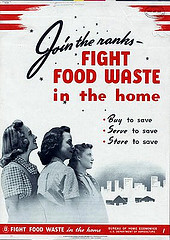- 6 reads

When your mother tells you to finish all the food on your plate, it isn’t just because there are starving people in India. Americans waste the most food in the world—the average household throws out $500 worth of spoiled or uneaten food each year. Restaurants and grocery stores are the biggest culprits, but there are several steps you can take to reduce your food waste and get your money’s worth at the market.
- Don’t shop when you’re hungry- avoiding impulse buys can cut down on the amount of money you spend on food, and you probably won’t be able to eat all of it before it expires.
- Buying in bulk can save on packaging and save you money, but only if you can eat all of it before it goes bad. For highly-perishable items, buying local and organic is the best option for your wallet, your stomach, and the environment.
- Be fruitful- Americans throw out about a quarter of the fruits and vegetables they buy, and knowing how to buy and store produce is important. Cherries are shipped and stored at cool temperatures, and once that coolness is broken they start to decompose. Tomatoes break down more quickly when refrigerated, but then can be more easily made into a sauce. Citric fruits such as lemons, limes and oranges should be kept in one of the bottom drawers, as their acidity can destroy the cooling system in most modern refrigerators. Many fruits and veggies are sensitive to moisture, so do not wash them before storing them.
- Refrigeration expends about 18% of our energy, and efficient measures can keep your costs down and your food ripe. Set your fridge at 35-38 deg F. If you don’t already have one, an Energy Star refrigerator is important in keeping your costs down and the planet cool. When you come home with fresh groceries, store them towards the back of the fridge to keep the more tenured foods in higher priority. This is an especially good idea for time-delicate food like yogurt, which you should line up with the closest expirations at the front. If you have unused parkas or pillows you can fill up the empty fridge space with them, which will reduce the electricity used for recooling air and will prevent warm air from reaching cold items.
- Try broadening your culinary skills with leftover-friendly recipes. This way you can use up those miscellaneous items before they go bad. Occasionally, even with these food-saving techniques you might find some food maturing faster than you had expected. Don’t be so hasty to make waste—old white rice is better than fresh rice for making fried rice; stale bread can make sweeter French toast or bread pudding; and old bananas can be turned into treats or baked into banana bread.
- If it really is too late to save it, compost it. You can combine kitchen scraps and garden trimmings in your yard or home compost system which can spruce up your garden.
- Spoiled citrus fruits make great cleansers, such as an old lemon to freshen up a garbage disposal or dishwasher, or a dried up onion to clean a dirty grill.

